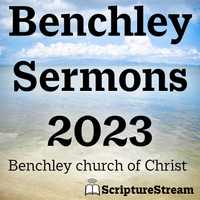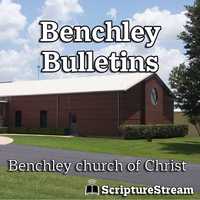Acts 14:15 says that God made “heaven and earth, and the sea, and all things that are therein.” In Genesis 1 we have recorded several times that “God looked upon that which He made and saw that it was good.” He made light, firmament, sun, moon, stars, plant life, fish, fowl, cattle, and man. God saw that all He made was very good. But of all that He created in six days, man was His special creation. But He was not through creating; His most glorious creation was yet to come. We read of this new creation in 2 Corinthians 5:17. “Therefore if any man be in Christ, he is a new creation.” (ESV) This is His most glorious work. Read Ephesians 3:3-11.
Paul’s assigned work was to preach to Gentiles, Jews, and kings (Acts 9:15). He did his work. He preached to Gentiles. He preached to Jews, and he preached to kings (Acts 26:13). He did not preach to make celestial angels see the wisdom of God as many try to make this passage say. Principalities and powers in heavenly places does not refer to celestial angels. It speaks of rulers in high places. Chapter 6 verse 12 gives us the key to how “heavenly” is used in Ephesians. “Heavenly” refers to the highest of the class being discussed. Principalities, powers, and rulers of darkness of this world certainly do not refer to things in heaven. They speak of men in high places. “Heavenly” is thus used in Ephesians 2:6; 1:20; 3:10. Just as the temple showed the wisdom of Solomon, the church the saved relationship in Christ Jesus shows the manifold wisdom God more than any other of His creation.
Man cannot improve upon the things God created in six days, and he knows it. And man cannot improve upon God’s most glorious work, but many think they can. Man today has the audacity to set aside God’s most glorious work by building and upholding manmade institutions of religion and asserting that they are better than God’s most glorious work. Every denomination is an example of this very thing. Christians have long marveled that man could be so bold and disrespectful. But today many who claim to be saints in Christ’s church are caught up in the same error.
Whatever it is called, if it solicits contributions in order to do the worship and work that God specified the church to do it has gone beyond the doctrine of Christ. And when they condemn denominations, they condemn themselves, Romans 2:21. They have become a completely different fellowship than God’s most glorious work.
In this church which is God’s most glorious work saints are to function individually. Passages like Ephesians 4:28, 1 Timothy 5:16, and 1 Timothy 4:22 show this to be so. And saints are to function collectively, under common oversight and with pooled resources. Passages like Acts 20:28, Ephesians 5:19 and 1 Corinthians 16:1-2 show this to be so.
The local church is all that we need for together and collective functions in the things of Christ. To build human institutions to do the work assigned the local church shows a lack of respect for God’s Word and His local church arrangement. If a work has been assigned for a local church, the local church is sufficient to do it. If a work has not been assigned for local church function local church funds should not be used to do it, nor should elders oversee it.
God’s saved relationship is the only relationship in which one can be saved and the local church is the only relationship for work assigned to be done under a common oversight and with pooled resources. When we do individual and congregationally that which has been so assigned, the church magnifies the manifold wisdom of God. But when men do not respect God’s arrangement for both individual and congregational work, they do not show God’s wisdom to anyone.
One final word: Paul considered his service in Christ to be a gift of grace and so should we. Paul’s service was and ours is to teach the unsearchable riches of Christ, and then live it.
Jesse Jenkins



